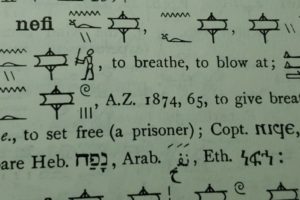Things of the Jews
In the Stick of Joseph, Nefi writes:
the Y’hudim do understand the things of the prophets. And there is no other people that understand the things which were spoken unto the Y’hudim like unto them, except it be that they are taught after the manner of the things of the Y’hudim. (2 Nefi 11:2)
Certainly the Seven Rules of Hillel are to be counted among these “things of the Jews” that are needed to understand “the things that were spoken unto the Y’hudim.” The Jewish Encyclopedia says of them that they are “the chief guides for the interpretation of the Scriptures and for the deduction of laws from them.”
Hillel did not create the Seven Rules of Hillel. In fact the Seven Rules of Hillel existed long before Hillel (60 BCE – 20 CE?); he was simply the first to write them down. The rules are so old we see them used in the Tanakh (Old Testament).
For purposes of this article we will only be discussing the First of Hillel’s seven rules, the rule of “kol v’khomer.” The Jewish Encyclopedia describes this rule as:
“Argumentum a minori ad majus” or “a majori ad minus”; corresponding to the scholastic proof a fortiori.
The kol v’khomer rule says that what applies in a less important case will certainly apply in a more important case. A kol v’khomer argument is often, but not always, signaled by a phrase like “how much more…” Here are some examples of kol v’khomer in the Tanakh:
Behold the righteous shall be recompensed in the earth:
much more the wicked and the sinner. (Proverbs 11:31)
If you have run with footmen and they have wearied you,
then how can you contend with horses? (Jerermiah 12:5a)
Other Tanakh examples can be found in: Deuteronomy 31:27; 1 Samuel 23:3; Jeremiah 12:5b; Ezekiel 15:5; and Esther 9:12.
Nefi’s Education
The first words of the Stick of Joseph read:
I Nefi, having been born of goodly parents, therefore I was taught somewhat in all the learning of my father. And having seen many afflictions in the course of my days, nevertheless, having been highly favored of YHWH in all my days, yes, having had a great knowledge of the goodness and the mysteries of Elohim,…(1 Nefi 1:1)
There can be little doubt, both from these words and from Nefi’s record, that Lechi educated his sons in the principles that came to be known as the Seven Rules of Hillel.
In fact in 1 Nefi 1:14, Nefi’s brothers spar with Nefi, using a kol v’khomer argument:
And after the angel had departed, Laman and L’mu’el again began to murmur, saying, How is it possible that YHWH will deliver Lavan into our hands? Behold, he is a mighty man and he can command fifty, yes, even he can slay fifty, then why not us? (1 Nefi 1:14)
But Nefi responds with a kol v’komer argument of his own:
And it came to pass that I spoke unto my brothers, saying, Let us go up again unto Yerushalayim, and let us be faithful in keeping the mitzvot of YHWH. For behold, he is mightier than all the earth, then why not mightier than Lavan and his fifty? Yes, or even than his tens of thousands? (1 Nefi 1:15)
Nefi’s brothers had also been educated by Lechi in the use of kol v’khomer. But Nefi overcomes their kol v’khomer argument with an even stronger kol v’khomer argument. Their argument was flawed, because the true argument is not to weigh the might of Nefi and his brothers against the might of Lavan, but to weigh the might of Lavan against that of YHWH!
It should come as no surprise to us that Nefi and his brothers would be sparring using kol v’khomer arguments, because, as Nefi pointed out, they were brought up and educated in this method of reasoning.
Later, in 1 Nefi 2:3, Nefi reminds his brothers that his above argument proved to be correct, and he reiterates it:
And now I, Nefi, being grieved for the hardness of their hearts, therefore I spoke unto them, saying — yes, even unto Laman and unto L’mu’el — Behold, you are my elder brothers, and how is it that you are so hard in your hearts and so blind in your minds that you have need that I, your younger brother, should speak unto you? Yes, and set an example for you? How is it that you have not hearkened unto the word of YHWH? How is it that you have forgotten that you have seen an angel of YHWH? Yes, and how is it that you have forgotten what great things YHWH has done for us in delivering us out of the hands of Lavan? And also that we should obtain the record? Yes, and how is it that you have forgotten that YHWH is able to do all things according to his will for the children of men, if it so be that they exercise faith in him? Wherefore, let us be faithful to him. (1 Nefi 2:3)
On another occasion Nefi presents a similar kol v’khomer argument to his brothers, when they doubt his ability to build a ship.
And now, if YHWH has such great power and has worked so many miracles among the children of men, how is it that he cannot instruct me that I should build a ship? (1 Nefi 5:22)
Applying kol v’khomer to the Stick of Joseph
Finally, Nefi uses a kol v’khomer argument to argue that if Messiah was to undergo T’villah to “fulfill all righteousness” then “how much more” should we undergo T’villah:
And now, if the Lamb of Elohim, he being holy, should have need to be washed by immersion in water to fulfill all righteousness, oh, then, how much more need have we, being unholy, to be washed by immersion, yes, even by water? (2 Nefi 13:2)
In several passages, the Stick of Joseph mentions that the Messiah “fulfilled” the Torah. For example, when Yeshua addresses the Nefites, he says:
Behold, I say unto you that the Torah is fulfilled that was given unto Moshe. Behold, I am he that gave the Torah, and I am he who covenanted with my people Isra’el. Therefore, the Torah in me is fulfilled, for I have come to fulfill the Torah… (3 Nefi 7:2)
What does it mean to fulfill the Torah? David Bivin and Roy Blizzard wrote:
‘Destroy’ and ‘fulfill’ are technical terms used in rabbinic argumentation. When a rabbi felt that his colleague had misinterpreted a passage of Scripture, he would say, ‘You are destroying the Law!’ Needless to say, in most cases his colleague strongly disagreed. What was ‘destroying the Law’ for one rabbi, was ‘fulfilling the Law’ (correctly interpreting Scripture) for another.
(Bivin, D. and Blizzard, R. (1983) Understanding the Difficult Words of Jesus. Arcadia, CA: Makor Publishing, p. 154).
Yosef ben Yosef understood “fulfilled the law” to mean that Messiah “magnified” the Torah and made it “honorable” and not that he destroyed it. He said that Messiah himself “fulfil[l]ed all righteousness in becoming obedient to the the (sic) Law which himself had given to Moses on the mount and thereby magnified it and made it honorable instead of destroying it” (Cook, L.W. & Ehat, A.F. (Eds.) (1980) The Words of Joseph Smith. Salt Lake City, UT: Bookcraft, p. 162-3).
This raises an important question. If Messiah, who is holy also fulfilled the Torah, who can say that we who are unholy should not “walk even as he walked” (1 Yochanan 2:6)?






Leave a Reply